What We Treat
We Treat Different Types Of Pain
Most people experience significant pain at some time in their lives – whether from an injury, illness, or an unknown cause. Pain is a normal, human experience. Without the ability to experience pain, humans would not survive.
Living in pain however, is not normal. In the last several years, our knowledge of how pain works has increased considerably. In many persistent pain states, focus has been shifted to the nervous system and how the brain processes information from the body and the environment. This is for all pain, regardless of where it is in the body and how long it has been going on.
The latest research shows that the more you know about pain and how it works, the better off you’ll be. This includes moving and functioning better, experiencing less pain and having an increased ability and interest in doing more healthy exercise and movement. This knowledge is essential in your recovery.
What can you do? Which treatment is right for you?
Often times, people suffering from pain take medication to dull the pain. Taking medication is understandable when pain is constant and unbearable. It may be helpful to dull the symptoms for a short period of time, but it won’t get at the root of the problem and correct it. It’s like hitting the snooze button on an alarm. Unless the cause of the pain is treated, your body will keep sounding the alarm and reminding you that something is out of balance. Eventually, the pain may get worse or become chronic. It is also possible for the medications to cause unwanted side effects and further compromise your health.
Surgery may be another option. At times, this approach may make sense, but it could be both expensive and risky and there is no guarantee that it will be effective.
Acupuncture is a time-tested, safe, effective, natural and drug-free way to eliminate pain. Unlike other methods of handling pain, there are side effects. The World Health Organization (WHO) and the National Institutes of health (NIH) acknowledge the benefits of acupuncture in treating and eliminating pain due to a wide range of causes.
Pain is individualized, which makes it so hard to treat. You need treatment tailored to your pain.
©Acu Market
Migraine/Stress Headaches
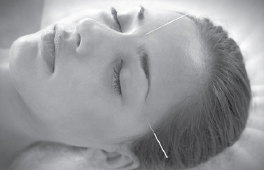 If you suffer from headaches, you are not alone. Over 50 million of us experience some form of a severe headache at some point in our lives. Whether you experience minor head pain or severe migraines, headaches can take valuable time out of your day and your life, and leave you searching for relief.
If you suffer from headaches, you are not alone. Over 50 million of us experience some form of a severe headache at some point in our lives. Whether you experience minor head pain or severe migraines, headaches can take valuable time out of your day and your life, and leave you searching for relief.
One way to seek relief is by reaching for drugs and other medications. This is fine for the short run, and can help you get out of pain fast. Unfortunately, common headache medications do not address the root cause(s), and when used over long periods of time can cause unwanted side effects.
Acupuncture and Traditional Chinese Medicine (TCM) offer a safe and effective approach to relieving headache pain, without causing harmful side effects, and incorporate a comprehensive diagnostic protocol that can help your acupuncturist understand and address the root cause(s) of your headaches.
Understanding headache types. There are many factors in TCM theory that may play a key role in the root cause(s) of a headache. These include body constitution, emotional health, excessive work, social and exercise activities, improper diet, physical trauma and hormones. Headaches can also be diagnosed according to specific symptoms, times of occurrence, location on the body, type of pain, triggers and remedies which provide relief.
A natural path to relief. Acupuncture and TCM takes a holistic, or whole-body approach to health. Your practitioner will also attempt to determine what root cause(s) are contributing to the overall problem. By identifying and treating the underlying cause(s), not just the symptoms, he/she can apply the most effective care.
©Acu Market
Anxiety / Depression
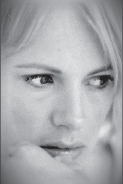 According to the Anxiety Disorders Association of America, anxiety disorders are the most common mental health disorder in the U.S., affecting 40 million adults and costing more than $42 billion a year.
Feelings of anxiety, worry and fear related to significant and challenging events are justified and very common. Anxiety becomes a problem when emotional reactions are out of proportion with what might be “normally” expected in a situation, and when symptoms interfere with a person’s daily functioning or sleep patterns. Mild anxiety leaves a person feeling a bit unsettled, while severe anxiety can be extremely debilitating.
Acupuncture can help. A clinical study conducted in China in 2010, has concluded that acupuncture is a “safe and effective” treatment for mood disorders including depression and severe anxiety, in some cases proving to increase the effectiveness of medication-based treatments. Additionally a 2009 study, again in China, determined that acupuncture alone could help patients who suffer from anxiety but cannot be chemically treated due to intolerable side-effects of medicine.
In many Western schools of thought, anxiety disorders are considered to be dysfunctions in a person’s brain chemistry. An acupuncturist does not view anxiety as a brain dysfunction, but rather as an imbalance in a person’s organ system. In Traditional Chinese Medicine, this imbalance is called Shan You Si (“anxiety & preoccupation”), and is believed to affect the main organs: the Heart, Lung, Spleen, Liver, and Kidneys. Each organ is related to different aspects of a person’s emotions.
The role of an acupuncturist is to investigate the underlying causes of the anxiety by carrying out a thorough diagnostic evaluation in order to determine which organ system has been affected and is out of balance. The acupuncturist will then seek to restore the imbalance by inserting fine, sterile needles into the points correlating to those organs. Additionally, acupuncture helps to reduce stress, ultimately encouraging and supporting a greater sense of well-being and balance.
©Acu Market
According to the Anxiety Disorders Association of America, anxiety disorders are the most common mental health disorder in the U.S., affecting 40 million adults and costing more than $42 billion a year.
Feelings of anxiety, worry and fear related to significant and challenging events are justified and very common. Anxiety becomes a problem when emotional reactions are out of proportion with what might be “normally” expected in a situation, and when symptoms interfere with a person’s daily functioning or sleep patterns. Mild anxiety leaves a person feeling a bit unsettled, while severe anxiety can be extremely debilitating.
Acupuncture can help. A clinical study conducted in China in 2010, has concluded that acupuncture is a “safe and effective” treatment for mood disorders including depression and severe anxiety, in some cases proving to increase the effectiveness of medication-based treatments. Additionally a 2009 study, again in China, determined that acupuncture alone could help patients who suffer from anxiety but cannot be chemically treated due to intolerable side-effects of medicine.
In many Western schools of thought, anxiety disorders are considered to be dysfunctions in a person’s brain chemistry. An acupuncturist does not view anxiety as a brain dysfunction, but rather as an imbalance in a person’s organ system. In Traditional Chinese Medicine, this imbalance is called Shan You Si (“anxiety & preoccupation”), and is believed to affect the main organs: the Heart, Lung, Spleen, Liver, and Kidneys. Each organ is related to different aspects of a person’s emotions.
The role of an acupuncturist is to investigate the underlying causes of the anxiety by carrying out a thorough diagnostic evaluation in order to determine which organ system has been affected and is out of balance. The acupuncturist will then seek to restore the imbalance by inserting fine, sterile needles into the points correlating to those organs. Additionally, acupuncture helps to reduce stress, ultimately encouraging and supporting a greater sense of well-being and balance.
©Acu Market
Digestive Disorders
- Gas & Bloating
- Acid Reflux
- Small Intestine Bacteria Overgrowth (SIBO)
- Nausea
- Crohn’s Disease
- Leaky Gut Syndrome
- Constipation
- Colitis
- Irritable Bowel Syndrome
- Diarrhea
- Stomach Pain
- Hepatitis
- Diabetes
- Celiac Disease
- Gall Bladder Disorders
- Cramps
- Weight Gain
- Peptic Ulcers
- Diverticulitis
- Food Sensitivities
Our office precautions for COVID safety
- We follow Contact Exposure Guidelines
- Global Industrial Anti-Viral/Ozone/UV Air Purifiers in Clinic with HEPA Filter
- Individual Treatment Rooms
- Hand Sanitizer in Every Room and Front Office
- Contactless payment options
COVID Post Viral Recovery "Long Haulers"
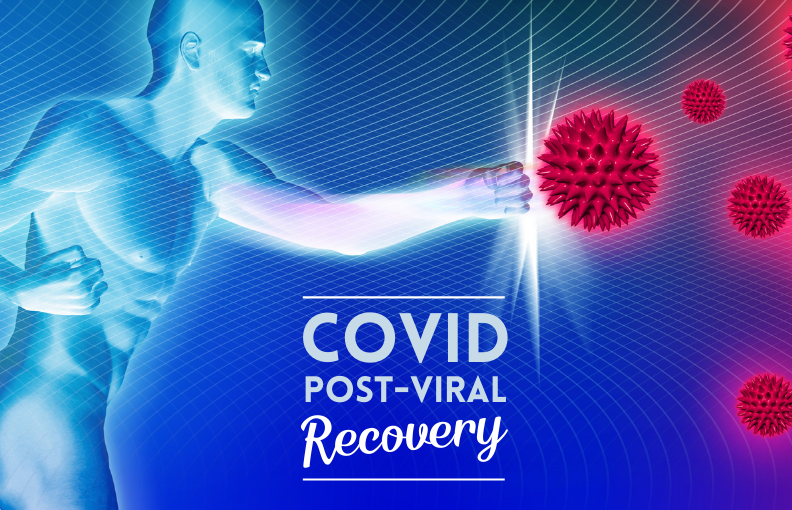
- Cough with Sore Throat
- Prolonged Loss of Smell / Taste
- Nerve Dysfunction / Pain
- Fatigue
- Cognitive Dysfunction / Brain Fog
- Difficulty Concentrating
- Digestive Issues
- Anxiety / Depression
- Sleep Disturbance
- Body Temperature Issues
Research is ongoing: however, preliminary data is showing promise that Acupuncture can stimulate the body’s many regulatory systems. In our own office, we have witnessed impressive recoveries using ELECTRO-ACUPUNCTURE MEDICINE as the foundation of our integrative treatment for patients with Post Viral Syndrome.

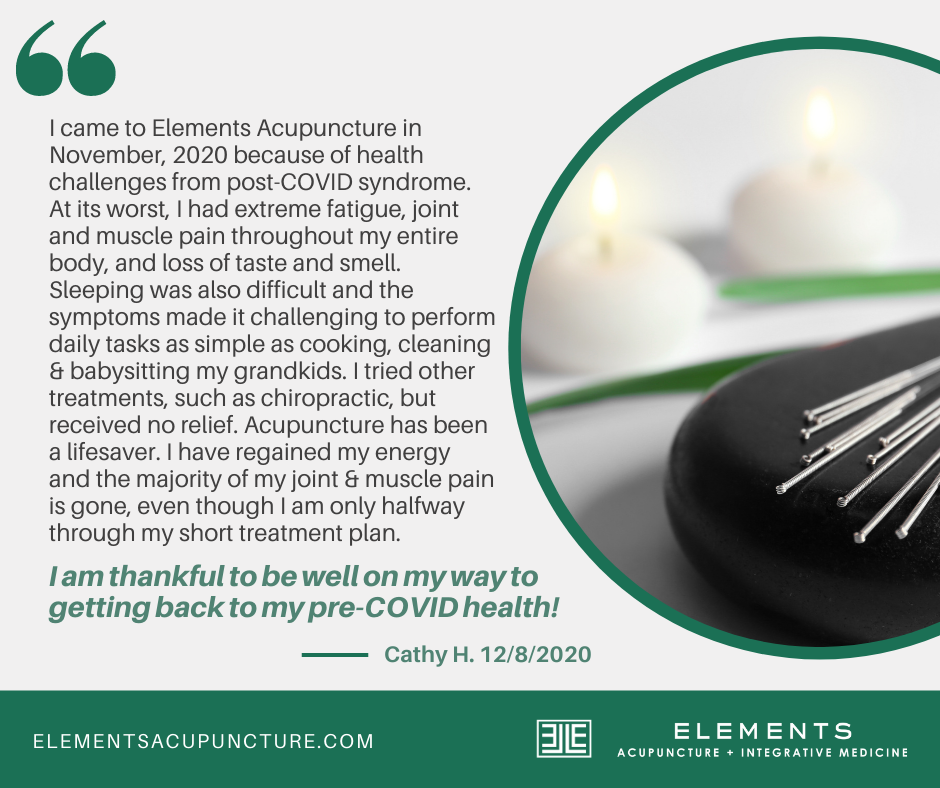
Other Conditions
Insomnia
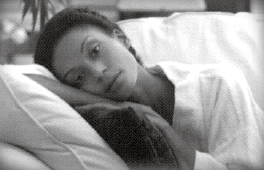 You settle into a warm, comfortable bed, close your eyes and nothing happens, you just can’t fall asleep. Hours go by and still you’re awake, The next day you feel tired, grouchy and are unable to focus. Does this sound familiar?
You settle into a warm, comfortable bed, close your eyes and nothing happens, you just can’t fall asleep. Hours go by and still you’re awake, The next day you feel tired, grouchy and are unable to focus. Does this sound familiar?
Sleepless nights happen to almost everyone at some time, but ongoing insomnia can indicate a deeper issue and could lead to further health concerns. Unfortunately, a common approach to treating insomnia includes prescription sleeping medications, which can cause side effects or even dependence. That’s one of the many reasons to consider an all-natural approach to treating your sleep problems. Acupuncture can be a very effective way to improve your sleep quality without side effects.
One bad night…or an ongoing issue? Occasional insomnia is a very common problem, affecting about one in four Americans. It can happen to anyone, but is more common in older adults. Its symptoms include:
- Difficulty falling asleep
- Waking up during the night
- Waking up too early
- Daytime fatigue and irritability
- Frustration and moodiness
How acupuncture can help: According to the theories of acupuncture and Traditional Chinese Medicine (TCM), conditions such as insomnia are a sign of an imbalance in Qi (pronounced “chee”), the vital energy that animates the body and protects it from illness.
This imbalance can stem from a number of causes such as stress, anxiety, medications, depression, and chronic pain. To determine the underlying causes of your insomnia, your acupuncturist will take into account many factors, including your lifestyle and emotional and mental well-being. They will then work to restore the balance and flow of Qi by inserting fine, sterile needles at specific points along the body.
Your acupuncturist can get to the root of your sleep issues by taking into account all of the factors that may be contributing to your sleep disturbance. With this ancient form of health care, you can treat your symptoms, improve your overall health and well-being, and start looking forward to a great night’s sleep, every night.
©Acu Market
Infertility
 The treatment of infertility with acupuncture and Chinese medicine dates back 2,000 years. These ancient, time-tested techniques improve fertility rates and support a woman’s whole body, unlocking unlimited potential for health, healing and childbearing.
The treatment of infertility with acupuncture and Chinese medicine dates back 2,000 years. These ancient, time-tested techniques improve fertility rates and support a woman’s whole body, unlocking unlimited potential for health, healing and childbearing.
A landmark study published in the medical journal Fertility & Sterility, found that acupuncture dramatically improves the chances of becoming pregnant when used in conjunction with other assisted reproductive techniques. Researchers from Weill Cornell Medical Center in New York reviewed studies and concluded that acupuncture helps to:
- increase blood flow to the uterus, which improves the chances of an ovum implanting on the uterine wall
- reduce anxiety, stress and the hormones that are secreted during stressful situations that can significantly decrease fertility
- normalize hormone and endocrine systems that regulate ovulation, especially in women with polycystic ovarian syndrome
- positively affect the hypothalamic-pituitary-ovarian axis, which plays a key role in fertility
- regulate menstrual cycle
Acupuncture and Chinese medicine can raise the fertility potential for women by affecting the quality, quantity, balance and flow of Qi (nerves) and blood. When these are circulating freely throughout the body, every cell, tissue and organ is properly nourished and functioning well.
Hormone Balance
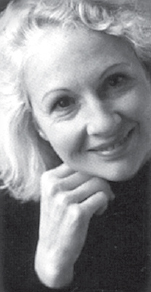 Why is menopause treated like a disease, when in fact it’s a naturally occurring process?
Why is menopause treated like a disease, when in fact it’s a naturally occurring process?
Menopause is a natural, physiological cycle that occurs in all women. Conventional medical treatments only address various symptoms and signs associated with menopause. However, symptoms and signs are just one part of the whole picture.
Acupuncture and Chinese medicine understand that symptoms and signs are merely indications of an imbalance deep within the body. This 5,000 year-old healing art focuses upon correcting underlying imbalances that have occurred over the years. These imbalances, if left unchecked, will result in a variety of symptoms and signs normally associated with a Western diagnosis of menopause. Acupuncture and a woman’s natural process. Menopause signifies “a change” within a woman’s life. This change occurs because a woman’s body chemistry is shifting. Chinese medicine recognizes this chemistry change as a natural process’.
Estrogen is similar to what acupuncturists call Jing Qi. Jing Qi is like a gift that is given to all of us at the time of conception. It is the battery that provides us with the basic energy to power all our life functions. When Jing Qi is abundant, our ability to adapt to disease, illness and stress is optimal.
As we age, our supply of Jing Qi energy is slowly drained. Generally, Jing Qi naturally begins to decline between the ages of 35 to 60, although some people drain it faster than others. When Jing Qi declines, the Organ Systems within our body become unbalanced.
This leads to various symptoms and signs, such as graying hair, loss of libido, weakness of knees, urinary difficulty, poor memory, backache and fatigue.
Acupuncture and Chinese medicine offer a safe, natural, drug-free and effective way to address menopause. Treatment supports the healing energies of Jing, Yin and Yang, providing the body with the building blocks it needs in order to nourish, heal, and regain balance.
©Acu Market
Allergies
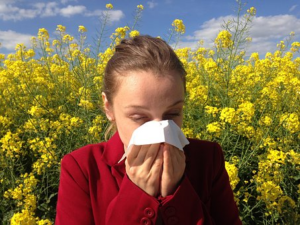 Allergies, seasonal or year round, are an ongoing problem for many individuals. Seasonal allergies typically affect people during a particular season or time of year. They are also referred to as outdoor allergies and are generally triggered by tree, grass and weed pollens or outdoor mold spores. Year round allergies also known as indoor allergies are typically brought on by animal dander, dust mites, mold spores or insect allergens. There are also food allergies, which occur as a result of eating a cuprit food, and can also create physical and/or emotional symptoms such as body hives, swelling, itching or redness of the skin, depression and/or moodiness.
Allergies, seasonal or year round, are an ongoing problem for many individuals. Seasonal allergies typically affect people during a particular season or time of year. They are also referred to as outdoor allergies and are generally triggered by tree, grass and weed pollens or outdoor mold spores. Year round allergies also known as indoor allergies are typically brought on by animal dander, dust mites, mold spores or insect allergens. There are also food allergies, which occur as a result of eating a cuprit food, and can also create physical and/or emotional symptoms such as body hives, swelling, itching or redness of the skin, depression and/or moodiness.
No matter what kind of allergy you suffer from, environmental or food related, acupuncture can provide needed relief. While medications (over-the-counter or prescribed) often come with unwanted side-effects, acupuncture does not. This makes acupuncture an appealing option for people looking for a new way to combat allergies.
According to Chinese medical theory, the symptoms and signs that indicate a Western diagnosis of allergies, relate to imbalances in the organs systems of the body. These imbalances may stem from a variety of causes, including stress, poor diet, foods that don’t agree with your body, pollutants and environmental toxins. Over time, if imbalances remain within the body, they will affect the functioning of the organ systems.
Acupuncture treatments may be combined with herbs, dietary changes and/or nutraceuticals. These therapies accelerate the healing process in order to balance, build and support the health and functioning of your body’s systems.
